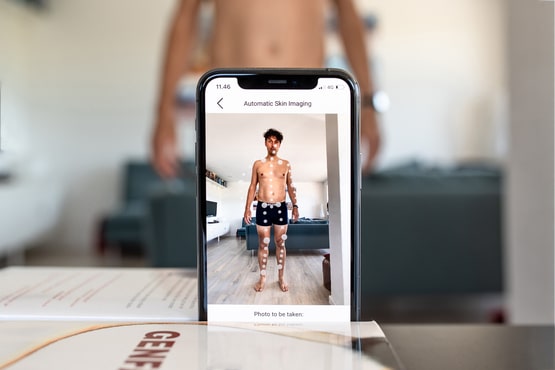Miiskin releases new tech to help patients track skin changes at home

Miiskin has released new skin imaging technology to help support patients tracking changes to their own skin at home.
The company introduced automatic skin imaging that allows people to take full body photographs of their own skin to make skin cancer self-examinations easier.
The new feature applies the latest computer vision and augmented reality technologies to audibly and visually aid the user in taking photos alone and hands-free. The user simply places their phone on a desk or table and stands in front of the camera. They are then guided by the Siri voice to move and pose whilst the photographs are taken.
Currently available on iPhone XS, XR, 11, 11 Pro and SE 2020, the technology was developed after a Miiskin analysis found that users are less likely to take photos of harder to self-photograph areas of the body – particularly their back. Latest stats reveal that only 15% of photographs taken on the app are of areas on a person’s back despite it being an area that is often prone to skin cancer.
Users can also use a new privacy function to blur out any part of the images they don’t want to be visible on the photograph.
Jon Friis, founder and chief executive of Miiskin, said: “We’ve rapidly developed the technology to make it easier for people to detect changes to their skin early on and seek advice from their GP or specialist.
“This is the first time automatic skin imaging technology has been made available in a consumer app and means patients can take full body photos of their own skin, in private, to create a digital record of how their skin is changing overtime. The technology will make it easier for patients – particularly those who do not have anyone to help them capture photos.”
The Miiskin platform was created to help people identify changes in their skin and moles, with reminders to routinely check skin and the types of things to look for. The company teamed up with the British Skin Foundation in 2017 to help raise awareness of the importance of self-examination.
Dr Anton Alexandroff, consultant dermatologist and British Skin Foundation spokesperson, said: “Self-examination is important for patients – helping spot changes to existing moles, as well as new marks and moles – but this can be more challenging in harder to see areas.
“Collecting photo evidence can help people keep track of their skin – so they are able to provide their doctor with a digital record of potentially life-threatening changes to their own skin.”



